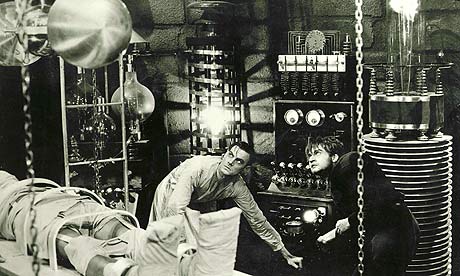生日快乐!尼古拉·特斯拉,谢谢你给我们带来了电!
来源:The Guardian 编辑:Vicki
生日快乐,尼古拉·特斯拉!虽然你现在已经离开了这个世界,或许你现在正在你的坟墓里睡觉呢,如果你的一些电磁学动力方面的理论实现了的话,这些都是有可能的。很多儿童都对特拉斯线圈熟悉,这种线圈通常被用来演示在高电压下放电现象的。谷歌也意识到了曼哈顿第40街和第6大道的交叉点有个“尼古拉特拉斯街角”。
Happy birthday, Nikola Tesla: thanks for the electricity

Happy birthday, Nikola Tesla - although you aren't alive today, having died in poverty on 7 January 1943 (having been born on 10 July 1856). Perhaps you're spinning in your grave - which might be possible if some of the inventions inspired by your work on electromagnetism(电磁学) and forces are being used.
Many children are familiar with the Tesla coil(特斯拉线圈) - used at science demonstrations and lectures to demonstrate what happens when you discharge a high voltage (but low current: it's current that kills, not voltage) over a small space. Films of Frankenstein often show, somewhat anachronistically(时代错误地), Tesla coils discharging lightning(特斯拉线圈放电避雷针)-like bolts like billy-o.
Tesla, an ethnic Serb from Smiljan, then part of the Austro-Hungarian empire, started out his engineering life working for a telephone company in Budapest in 1881, aged 24. He'd already studied physics and maths; While there - while walking in a park, in fact - he had an inspiration and solved the equations(方程式) relating to a revolving magnetic field(旋转磁场). Which he then drew in the ground with a stick and explained to a friend. Quite a patient friend, one suspects.
Not much to you, perhaps, but those equations govern the induction motor, which is now the most common form of electric motor: put three coils around an outside former, and put a rotating element inside. If you run a current through the outside coils, and get the timing just right, then you create a current (and hence magnetic force) in the coils in the inside. So the inside rotor turns, but it doesn't have to touch the outer part: less friction means less energy used. (Compare that method to the carbon brushes needed in standard DC motors, which wear away where they touch the inner rotor.)
But it's in the development of mains electricity - the underpinning of our modern age - that Tesla really rules. When Americans tell the story of Thomas Edison, the famous inventor of the gramophone, and whose name is usually attached to the invention of the light bulb, Tesla's name is frequently left out.
However Tesla, who became an American citizen in 1891, worked with Edison for years, improving many of the early inventions and turning them into something workable. (The two were introduced in 1884, when Tesla came to the US, by a letter from a mutual friend to Edison which read "I know of two great men. One is you and the other is this young man.")
Yet it's thanks to Tesla, not Edison, that we have electricity coming out of plugs(插头,插座), and that we even have power stations able to generate serious amounts of energy. He won "the war of the currents" with Edison, who was convinced that direct current (DC) - the sort that comes out of an ordinary battery - was the way forward for power generation and distribution. Tesla was able to show that alternating current (AC) - which swaps its polarity at a regular rate, 50 times a second in UK mains electricity - was far more efficient (you don't lose anything like as much energy in transmitting it over long distances).
Even though Edison took to electrocuting dogs in public displays to show just how dangerous AC was (no, really), Tesla won the day. Where DC could only be transmitted for a couple of miles before the resistance of the lines reduced it to nothing, AC can be transmitted at high voltages for many times that distance. (A side note: did you know that the distribution equipment - transformers, transmission lines - is 80% of the cost of running an electricity company? The power generation is only 20%. Which is why even if we had free electricity generation - say from nuclear fusion - the upkeep(保养,维修) of the distribution network would still mean you'd get a bill every quarter. Quite probably it would still be for the house next door which isn't on the same provider, too.)
And to quote his biography,
Among his discoveries are the fluorescent light(荧光灯) , laser beam(激光光束), wireless communications, wireless transmission of electrical energy, remote control, robotics, Tesla's turbines and vertical take off aircraft. Tesla is the father of the radio and the modern electrical transmissions systems. He registered over 700 patents worldwide. His vision included exploration of solar energy and the power of the sea. He foresaw interplanetary communications and satellites.
Then again, he also had ideas for the "death ray" - what we might now recognise as a directed energy weapon - and an ion-propelled (离子推动的)aircraft (which was proven to be feasible).
However his life ended sadly: he spent the last ten years of his life in the two-room suite 3327 of the New Yorker Hotel, having sold his patents and racked up substantial debts. After his death, the New York Supreme court ruled that he - rather than Marconi - invented the radio.
Even Google has noticed - given that New York State some time ago proclaimed today as Tesla's birthday, and that the corner of 40th Street and 6th Avenue in Manhattan has a street sign saying "Nikola Tesla corner".
If they were sensible, it would be a rotating sign, But you can't have everything.
Keke View:特斯拉(Nikola Tesla,1856—1943)出生于克罗地亚的史密里安,后加入美国籍。早年在巴黎欧洲大陆爱迪生公司任职,因创造性的劳动,被转送到美国的爱迪生电器研究中心,与爱迪生(1847—1931)共同工作。
他发明了交流发电机。后来,他开创了特斯拉电气公司,从事交流发电机、电动机、变压器的生产,并进行高频技术研究,发明了高频发电机和高频变压器。1893年,他在芝加哥举行的世界博览会上用交流电作了出色的表演,并用他制成的“特斯拉线圈”证明了交流电的优点和安全性。












